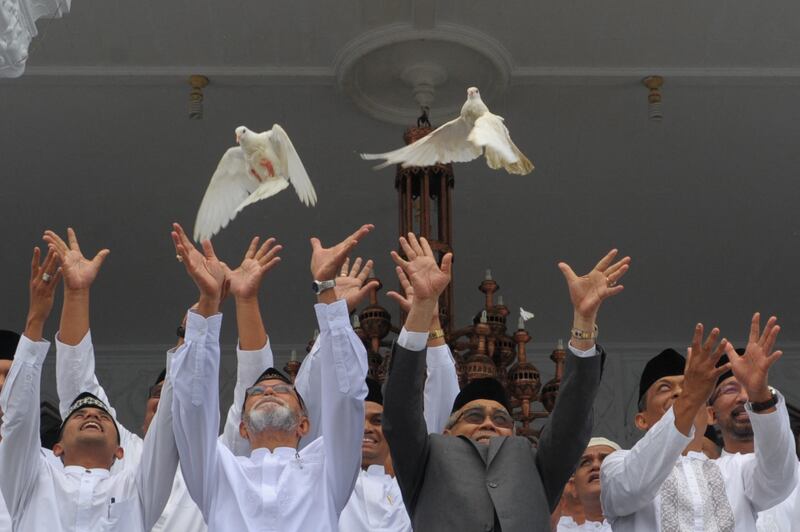Human rights groups and locals on Friday condemned authorities for demolishing a building where security forces had committed serious abuses during a decades-long separatist conflict in the Aceh region.
A local official said the house, known as Rumoh Geudong, was razed to erase painful memories, but some observers questioned its demolition this week ahead of a visit by President Joko “Jokowi” Widodo on June 27.
Acehnese saw Rumoh Geudong in Pidi regency as a symbol of the Indonesian military’s brutality during the past insurgency in the staunchly Muslim province that ended in 2005 when Jakarta and the Free Aceh Movement (GAM) struck a peace pact.
“They have destroyed, damaged and eliminated an important site that should serve as evidence for judicial purposes, in this case human rights courts,” Syahrul, the director of LBH Banda Aceh, a legal aid group, told BenarNews.
His group and others have been demanding that human rights courts be set up to try cases of abuse by the Indonesian security forces.
“This is one of the deliberate and organized ways of the state to provide impunity for the offenders of grave human rights abuses,” said Syahrul who, like many Indonesians, goes by one name.
The demolition took place June 19-21.
Rights activists and locals said that the military used Rumoh Geudong to detain and torture civilians accused of links to separatist rebels. They said many were killed or disappeared after being taken to the house.

Aceh, on the northern end of Sumatra island, gained special autonomy in 2005 after a peace agreement ended the war with GAM, a separatist group.
It is the only Indonesian province where Islamic law is practiced and that has its own local political parties, due to an autonomy scheme granted in 2002 to pacify the clamor for independence.
Rumoh Geudong was one of the sites investigated by Indonesia’s National Commission on Human Rights in 2018. It found evidence of grave abuses committed by the military in Aceh, including extrajudicial killings and rape.
Jokowi is scheduled to visit Aceh next week, including the site where the house stood.
During his visit, the president is expected to launch a non-judicial resolution process for past abuses in Aceh, based on recommendations from a government-appointed team.
Last year, the team identified 12 events between 1965 and 2003 as “serious human rights violations” committed by security forces across the country’s flashpoints.
The events include the shootings of alleged criminals in 1982-1985, killings of suspected Islamic militants by security forces in Lampung province in 1989, abductions of activists in 1997-1998, and torture of civilians by the special forces during the Aceh conflict.
Jokowi’s government has favored reconciliation and compensation measures to address the abuses. Victims’ groups and activists have criticized the policy as inadequate and unjust.
In January, Jokowi became the first Indonesian leader to acknowledge and express regret for those violations.
White veil vs whitewash
Usman Hamid, executive director of Amnesty International in Indonesia, said the house in Aceh “should be preserved, not destroyed.”
“The site has become a memorial monument because it has great cultural, historical and symbolic value, as a reminder of the suffering experienced by the people of Aceh during the armed conflict and to prevent similar events from happening again,” he said in a statement.
Usman said the demolition raised serious questions about the government’s commitment to addressing human rights violations in Aceh and elsewhere in Indonesia.
The government, though, defended the demolition, saying it was part of the restoration of the rights of the victims, who would receive various forms of assistance from the government.
Mohammad Mahfud MD, the coordinating minister for political, legal and security affairs, said a mosque would be built on the site. He said victims and their families had requested that.
“The victims will also sign a plaque, either in person or online,” he said.
He also said victims would receive free health insurance, scholarships and agricultural equipment.
One Pidie resident said he felt betrayed by the demolition of the house.
“They are trying to protect the violators of human rights at Rumoh Geudong by destroying the evidence,” Andy Firdaus Lancok told BenarNews.
Now, all that remains of the structure is a concrete staircase with a large rock next to it.
During his visit, Jokowi will draw a white veil over that staircase, Pidie Regent Wahyudi Adisiswanto said.
He hoped the new generation in Aceh would not hold grudges, he added.
“[I]t is a painful memory that we’d rather not recall,” Wahyudi said.
